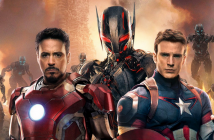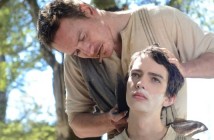
Avengers: Age of Ultron (2015)
Cast: Robert Downey Jr., Chris Evans, Mark Ruffalo
Director: Joss Whedon
Country: USA
Genre: Action | Adventure | Sci-Fi | Thriller
Editor’s Notes: Avengers: Age of Ultron is currently open in wide theatrical release.
Sequels are tricky things. The hope is that they will be at least as good if not better than the original, but that is seldom the case. In the case of Avengers: Age of Ultron, writer/director Joss Whedon had even more of a challenge, being that this is not only a sequel to the immensely successful The Avengers but it is the eleventh film in a franchise made up largely of single-character films that all build to these Avengers pictures. Whedon has been script-polishing these individual screenplays for years, making him the one in charge of most of them, making expectations for this film even higher. Even more pressure is added when the preceding films, known as the Marvel Cinematic Universe Phase 2 (The Avengers was the conclusion of Phase 1, though Phase 2 will officially conclude with Ant-Man later this summer), have all been the best of the individual films, growing the characters and in some cases (like Captain America: The Winter Soldier and Guardians of the Galaxy) redefining what a comic book movie can be.
It has all of Whedon’s trademark wit and humor but it is surprisingly unpolished and uneven.
So with all that riding on Avengers: Age of Ultron, it needed to be amazing. Unfortunately, and disappointingly, it is not. It has all of Whedon’s trademark wit and humor but it is surprisingly unpolished and uneven. That’s not to say it’s a bad film, it isn’t by a long shot, it just isn’t as good as it should be.

The story centers on Tony Stark (Robert Downey Jr., reprising the roll from the Iron Man films and The Avengers) wanting to create an A.I. program that would act as a sentry for the world, keeping out unwanted extra-terrestrial threats. He’s still struggling with his anxieties displayed in Iron Man 3, caused by the events in The Avengers. He’s very single-minded on this front and has been working with Bruce Banner (Mark Ruffalo, making him the first person to play the character in more than one film) to develop the Ultron program. After recovering Loki’s scepter, which was somehow not in their possession after it was used to close the portal in The Avengers, from Hydra (a group whose origins are detailed in Captain America: The First Avenger and their resurgence in Captain America: The Winter Soldier), Stark and Banner stumble upon a program that could just be their ticket to creating Ultron and saving the world. Unfortunately, Ultron (wonderfully voiced by James Spader) interprets world peace as destroying the Avengers first, then the rest of humanity and builds himself an army of drone bodies that share his consciousness to do this, as well as enlisting a set of twins who were enhanced by Hydra by way of the scepter, Pietro Maximoff/Quicksilver (played here by Aaron Taylor-Johnson, though the character was first seen in 2014’s X-Men: Days of Future Past played by Evan Peters) and Wanda Maximoff/Scarlet Witch (Elizabeth Olsen).
It’s not quite enough to elevate it to the level the franchise has set itself to and it is the weakest film in the franchise since Iron Man 2…
Back, along with RDJ and Ruffalo are Chris Evans as Captain America, Chris Hemsworth as Thor, Scarlet Johansson as Natasha Romanoff/Black Widow, Jeremy Renner as Clint Barton/Hawkeye, Samuel L. Jackson as Nick Fury as well as a myriad of characters from the other films in the franchise (without any of the Guardians of the Galaxy appearing). Later in the film, a new character is created, the Avengers staple The Vision (Paul Bettney, who also voices Jarvis, Tony Stark’s A.I.-ish omnipresent computer program).
With everyone back together and the tensions from the first film alleviated, one would think The Avengers would work as a well-oiled unit, given the opening action sequence showing them as such. However, due to Stark’s single-minded pursuit of the Ultron project and his refusal to take the dangers into account (obviously until it becomes a life-threatening entity), the team struggles to stay together. This is of course to set up the conflict that will define 2016’s Captain America: Civil War.
And therein lays one of the central issues with this film. Because it’s film 11 in a massive franchise, the likes of which has never been attempted in film, it has to make frequent callbacks to prior films and set up future ones. Since The Avengers, the series has been revealing Infinity Stones (their origins and power are explained by The Collector (Benicio Del Toro) in Guardians of the Galaxy) in a set-up to the final Avengers films, Avengers: Infinity War due out in 2018 and 2019. These callbacks and set-ups are great for continuity and keeping an over-arching plot throughout the films, but it mires something like this film that is designed as a capper to a phase and signals the next wave of films in the franchise. It bogs the whole thing down. Ordinarily I wouldn’t complain about a film in a franchise making sure everything fits together because it’s usually a failing of large franchises. Here though, it feels more like it’s the main reason it’s here.
There is also the problem with how Marvel producer Kevin Feige, the brain trust of this whole operation, farms out the action sequences to second units and outside effects companies and takes them out of the hands of the director sometimes before a lot of principle photography. This accounts for the uncharacteristic unevenness in the film. It feels like Whedon was not present for over a third of the film and it is noticed because Whedon is so talented. He has a decisive stamp that is sorely missed in many of the key sequences of the film. It’s this and other creative difficulties Whedon had making this film that has led him to leave Marvel films after this and leave the final Avengers film(s) in the hands of others. These creative differences definitely show in the film, and it suffers as a result.
I know it sounds like I hated Avengers: Age of Ultron, but that is not the case. It’s entertaining and fun, with Whedon’s trademark humor the saving grace of the film. He has interjected as much lightness as he could in this film, despite it trying hard to be as somber as a DC film. It’s not quite enough to elevate it to the level the franchise has set itself to and it is the weakest film in the franchise since Iron Man 2 (though the weakest is still The Incredible Hulk, which is unfortunate because the Hulk is an extremely interesting character and he deserves another shot to prove that). All said and done, Avengers: Age of Ultron falls short of repeating the tone and appeal of The Avengers but it’s still fun picture and a good stepping stone to future films in the MCU.
All said and done, Avengers: Age of Ultron falls short of repeating the tone and appeal of The Avengers but it’s still fun picture and a good stepping stone to future films in the MCU.



